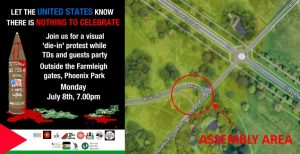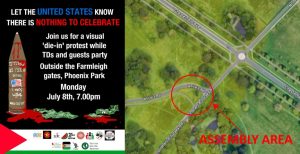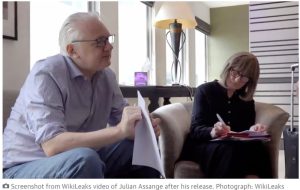Michael Mansfield QC on Palestine’s new status at the UN
Amelia Smith
Thursday, 06 December 2012 11:15
Mansfield describes the exercise of the Security Council veto as "totally anachronistic and anomalous".
EXCLUSIVE INTERVIEW
Almost one week after the United Nations upgraded Palestine to non-member observer status, it is very appropriate to be speaking with Michael Mansfield QC about Israel’s future. "Basically Israel is very, very isolated now," he tells me. "It needs to consider whether it wants to be this form of pariah."
A human rights lawyer and long-standing member of the Russell Tribunal, an international people’s court which examines violations of international law, Mansfield is insisting on the significance of last week’s vote. "Once you have a raft of actions, it’s exactly what happened in South Africa. In the end no country can be isolated, whatever Israelis may think."
Israel, on the other hand, is adamant that the upgrading of Palestine was purely symbolic. "The decision at the UN will change nothing on the ground," were the words used by Israeli Prime Minister Benjamin Netanyahu in anticipation of the vote. That was just before he authorised 3,000 new illegal settlement units to be built in the occupied West Bank and prevented the payment of Palestinian tax revenues.
Michael Mansfield QC on Palestine’s new status at the UN
Amelia Smith
Thursday, 06 December 2012 11:15
Mansfield describes the exercise of the Security Council veto as "totally anachronistic and anomalous".
EXCLUSIVE INTERVIEW
Almost one week after the United Nations upgraded Palestine to non-member observer status, it is very appropriate to be speaking with Michael Mansfield QC about Israel’s future. "Basically Israel is very, very isolated now," he tells me. "It needs to consider whether it wants to be this form of pariah."
A human rights lawyer and long-standing member of the Russell Tribunal, an international people’s court which examines violations of international law, Mansfield is insisting on the significance of last week’s vote. "Once you have a raft of actions, it’s exactly what happened in South Africa. In the end no country can be isolated, whatever Israelis may think."
Israel, on the other hand, is adamant that the upgrading of Palestine was purely symbolic. "The decision at the UN will change nothing on the ground," were the words used by Israeli Prime Minister Benjamin Netanyahu in anticipation of the vote. That was just before he authorised 3,000 new illegal settlement units to be built in the occupied West Bank and prevented the payment of Palestinian tax revenues.
"The upgrade is not symbolic at all, and plainly the Israelis don’t regard it as symbolic," Mansfield insists, "because they are taking punitive, collective action almost immediately. They did this over [the similar] UNESCO decision almost a year ago." The settlements are illegal, he explains, and are built in an area, which is "sacrosanct" for a two-state solution to work. "If there’s ever going to be an East Jerusalem capital of Palestine then the Israeli proposal will stop it."
Mansfield believes that these actions prove that Israel is not interested in a peaceful solution. "It is wedded to a one-state solution, that of a ‘Greater Israel’ for Jews, that is effectively what it’s about, and what it’s always been about. It’s not surprising that their actions are entirely in line with everything they’ve ever done, which is to ignore what the world says."
Despite Netanyahu’s cool demeanour, Israel has a number of reasons to be worried, not least possible action at the International Criminal Court (ICC). Palestine’s upgraded status means that the Palestinian Authority can now make applications for the court to consider prosecutions against Israel on a number of fronts. Mansfield explains what they are:
"Crimes against humanity, war crimes and the most important in which I’ve been involved, the crime of apartheid. The Russell Tribunal wasn’t the first to declare that Israel, not just in the Occupied Palestinian Territories but inside Israel as well, is practicing apartheid. I want to emphasise that this is not in the South African form. People get wound up and say ‘it’s nothing like South Africa’. In fact, it’s worse than South Africa."
In the lead up to the vote, Britain promised that it would only vote yes if Palestine promised not to go to the ICC. "It’s absolutely outrageous," Mansfield says. "There’s a vested interest here… Britain likes to be seen as America’s closest ally. There are a lot of other economic reasons as well; there are big ties between British companies and investment in Israel."
That Palestine can take Israel to the ICC is a great step forward. I wonder, in practice, how easy it will be for the PA to do it.
"Palestine owes this to everyone who has supported them and owes it to the rule of law to ensure that the norms that have been set down at the various international conventions and the ruling statute itself are upheld… this is a course that the PA must not be afraid to take up."
What about the court? "The ICC will tread carefully; it will be worried and there will be pressure on it, no doubt. This is a real test of whether the ICC means business or not. Is it a court that is really ever just going to look at African states or is it actually, as it should be, going to look at the bigger nations, particularly over the Iraq war, which it has steadfastly refused to do so far?"
An extremely frustrating aspect of the conflict is that Israel acts with apparent impunity, above the laws that courts like the ICC try to uphold. Mansfield gives the example of the "Separation Wall" judgement in 2004, where the International Court of Justice deemed the barrier being built through the West Bank to be illegal.
"The ICJ makes some suggestions about what the UN should do, but the UN doesn’t do anything as a result of the opinion it’s asked for and Israel ignores it. So I ask myself, what is the point of having a legitimacy of the rule of law, if the key people are going to ignore it?"
He gives a further example of nuclear weapons, as Israel has refused consistently to cooperate with the UN and weapons inspectors.
"We know that the Israelis have got nuclear weapons but they refuse to admit it formally and they don’t allow inspectorates to go there. Of course they’ve ignored most of the many, many resolutions passed about this over the past thirty years. The problem is that we may get the ICC concerned enough to investigate and then it’ll find itself unable to actually gain entry to Israel."
What else can we do then, if Israel refuses to cooperate with the law? "If you can’t get the law enforced you have to use other means, and what I mean by that is political and economic pressure. It will come down to Boycott, Divestment and Sanctions (BDS). There’s one thing that will turn Israel around; they talk about withholding money from the Palestinian side. Well if that’s the name of the game… the first thing you have to do is stop bankrolling Israel. It’s now one of the richest nations in the world, thanks primarily to the USA, which is not only bankrolling the Israeli economy, but also its arms trade as well. It seems to me that the only way Israel is going to begin to have any respect for the rule of law and international conventions is when it sees that its source of income is going to dry up."
The European Union is also guilty, Mansfield explains, of forging close ties with Israel and giving it preferential trading terms. "It’s a totally ludicrous situation; Israel is not a European nation and it certainly shouldn’t be getting preferential treatment when it’s an unlawful state… The EU has essentially become an accessory to illegal activity."
Mansfield speaks very highly about the Russell Tribunal, which helps to raise public awareness of the nature of the conflict in the Middle East and informs people of the "avenues that are open" to bring about change. The Palestine-Israel conflict is, after all, a global responsibility. "We all have a duty to do something," Mansfield insists.
"The Tribunal produces reports which spell out clearly what people can do either as individuals, groups or collectives," he explains further. The first stage is ensuring that you put pressure on your own government until they change. The second is persuading companies and corporations not to have links with a bad regime.
In pointing out that we all have an obligation called the international rule of law Mansfield explains that the Russell Tribunal also highlights laws that have been broken by Israel, international norms that have been laid down by many nations. "Those who don’t abide by them should think again about whether they should have continued membership of the UN."
In 2004, he adds, 14 of 15 judges at the International Court of Justice voted to say that Israel’s Wall is illegal. "Are we going to just stand by and say that the law doesn’t matter?" Slowly but surely the world is waking up; the Russell Tribunal continues to explain what people can do about Israeli breaches of the law. "As far as I can see it’s been relatively successful at mobilising opinion," he says.
When I ask about the role of the media in all of this, Mansfield bemoans the fact that it is "very difficult" to get these points across in the British media. "There’s a certain self censorship when it comes to Palestine and Israel and I don’t think there’s been fair reporting of what’s going on."
To put the recent UN vote in context, there have been a number of steps towards Palestinian statehood over the past 65 years. For example, in 1947 the UN partition resolution was adopted by the General Assembly, which proposed the creation of an Arab and a Jewish state in historic Palestine. In 1974 the Palestinian Liberation Organisation was granted observer status at the UN. So what is different about this vote?
"There’s been an Arab awakening in different countries taking different forms and I think there is a general awakening of political opinion throughout the world. The force and size of the majority of this vote, which nobody really predicted, lays down one of the biggest markers against Israel’s position than there has ever been, and it gives confidence," says Mansfield. "Each step is another brick in the confidence wall, but this one is pretty massive. That’s why I think it’s different. Palestine can now look back and rely on much more support from the international community."
This, though, is not enough; the UN itself has to reform he says. In order for Palestine to achieve full statehood, it will need Security Council backing. However, any one of the five permanent members of the Security Council – China, Russia, France, the UK and the USA – can veto such a move.
Mansfield describes the exercise of the Security Council veto as "totally anachronistic and anomalous". He goes on to explain that the US has an "appalling" history of using the veto against Palestine and in favour of Israel, more times than they’ve exercised it in relation to any other issue. "So the veto has to go. We can’t have one country standing in the way. I understand the historical reasons for its existence, but they don’t exist any more."
The General Assembly is much larger now than when the Security Council was first set up, he explains, so the Security Council, with only 15 members, "has got to embrace a much larger membership". The whole continent of South America, he notes by way of example, doesn’t have a permanent representative.
"The big sides get their permanency, plus they get the veto and that structural difficulty has to go." Until this situation changes, of course, Palestinian statehood is not going to get through the Security Council, "because if Obama’s not willing to do it then I’m not sure which American president would."
Despite this, there is something moving in the conflict. "It seems to me that there is a wall of pressure… although it will not be an immediate end, there has got to be an end; there will have to be an end, just as there was for apartheid South Africa. Any Israeli who believes that bombing the hell out of their neighbours is going to provide a peaceful future is living in cloud cuckoo land."
Throughout the interview it is clear how passionate the leading QC is about the subject. "As you can probably tell, I get really worked up about it," he tells me before we finish. "It makes me angrier than almost any other topic I can think about." That sounds like more good news for the Palestinians.






